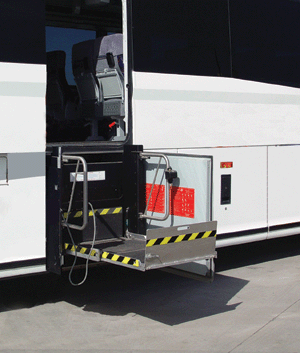ADA Compliance Center

The Americans with Disabilities Act (ADA) is a civil-rights law that guarantees people with disabilities an equal opportunity to take part in society. Transportation services are key to that participation. The ADA guarantees equal access to both public and private transportation services.
Today, over 61 million people in the United States have disabilities. These people have jobs, families, classes, meetings, travel plans, and other activities that keep them on the move. Motorcoach customers, including those with disabilities, desire good and safe service whether they are touring for leisure, making rail or air connections, or traveling between communities.
From 1999-2012, the FTA made about $99 million available to help private motorcoach operators phase in and comply with the fleet accessibility requirements through the ADA grant program thanks to ABA’s lobbying efforts in the highway reauthorization bills. The purpose of this grant program was to help defray the costs of compliance for private motorcoach companies under the terms of the Americans with Disabilities Act.
Today, there are numerous guides and training resources to assist with ADA complaince.
Compliance Highlights
Fleet Requirements
- A large fixed route motorcoach company must ensure that: (1) each new over-the-road-bus purchased or leased for fixed route service is accessible; and (2) their entire fixed route fleet must consist of accessible buses.
- A charter bus company must provide service in an accessible bus to passengers with disabilities when given at least 48-hour advance notice.
- A small bus operator that provides both fixed route (more than 25%) and charter services or mixed service does not need to comply with the fleet requirements for fixed route operators and can just comply with the 48-hour notice requirements.
Note: A Large Bus Operator, under DOT’s regulatory definition, is an operator that has gross annual transportation revenues of all its related and commonly controlled transportation entities equal to or exceeding $10.2 million (2018). This threshold is based upon the definition of a Class I motor carrier of passengers and is adjusted annually for inflation via a formula that utilizes Bureau of Labor Statistics data and the Producers Price Index (PPI). A small bus operator is any operator that has annual revenues less than the Class I threshold.
Service Responsibilities
- When a motorcoach makes a rest stop, people using mobility devices must be allowed to disembark if they wish.
- Operators should, if possible, provide customers with information about the accessibility of the rest stop.
- On trips longer than three (3) hours, drivers must provide a comfort stop upon request if the motorcoach has an inaccessible restroom.
- Fixed route operators providing interline service to customers using mobility devices are required to contact all subsequent carriers so that each one is prepared to provide accessible service for customers at transfer points.
- Operators must charge customers with disabilities the same fare as those without disabilities.
- Some service animals wear identification such as a tag, vest or special harness. If you are not sure that the animal is a service animal, you may ask if it is a pet or a service animal and you may ask what type of tasks the service animal performs.
- Certification or identification is not required for a service animal, and service may not be refused due to a lack of such identification.
- The service animal must stay with the owner and be kept under control at all times.
- Should know the maximum size and weight capacities of the motorcoach’s lift equipment because the size and weight of customers’ mobility devices vary.
- Should cycle the wheelchair lift as part of the pre-trip safety inspection to ensure that it is in working order.
ADA Compliance Oversight
Both the Federal Motor Carrier Safety Administration (FMCSA) and the Department of Justice (DOJ) have oversight over ADA compliance for motorcoach operators. FMCSA has published the following compliance guidelines to assist operators.
FMCSA ADA Compliance Guidelines
Don’t Forget to Retain Your Annual ADA Usage and Acquisition Reports to Demonstrate Compliance!
Annual ADA Usage & Acquisition Reports
Contact the FMCSA’s Peter Chandler with additional ADA questions at peter.chandler@fmcsa.dot.gov or (202) 366-5763.
Follow recent DOJ ADA enforcement actions:
Related Resources
- DOJ Brief on Service Animals
- FMCSA Guidance on Interline Service
- Download the ADA Self-Study Guide & Training Packet
- Additional Training Resources for ADA Compliance & Customer Service from the National Aging and Disability Transportation Center
- Learn more about the Open Doors Organization’s in-person training and compliance coaching
- Is Your Website ADA Compliant? It Should Be
